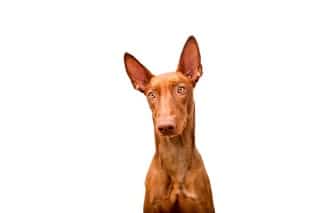
The Pharaoh Hound is a breed of hound that originated in Malta and dates back to the days of the Pharaohs of Ancient Egypt. It is the national hound of Malta and is know for its unique appearance and friendly demeanor. This breed is known for its strong, lean athletic build, with well-defined musculature and a sculpted, wedge-shaped head. It is well balanced in appearance with a medium sized frame and strong legs. The breed has a distinctive long, narrow head with a slightly curved muzzle and dark, hazel colored eyes. Their ears are pointed, fleshy and set high on the head which allows them to capture sound from far distances.
The Pharaoh Hound is also known for its fine, medium length coat which is often white in color but can also come in shades of fawn, red and tan. It also has lighter feathering on its feet, muzzle, and back of legs. Breeds such as Greyhound, Whippet, and Ibizan Hound have been suggested as breeds used in its creation. The Pharaoh Hound’s friendly and lively temperament, coupled with its intelligence and eagerness to please, makes them a wonderful companion. What truly sets them aside from other breeds is their distinctive facial markings, called “”blushes,”” which gives them a striking, regal appearance.
The Pharaoh Hound is an active and alert dog breed with a friendly and gentle temperament. They are incredibly intelligent and have great problem-solving abilities. They love to play and explore, and they are incredibly patient and tolerant. They tend to do well with children and other pets, though early socialization is important to ensure they will continue to form strong bonds with their family members.
Pharaoh Hounds are active dogs and need regular exercise, preferably daily walks and playtime. They do have a moderate energy level and can live happily indoors with their family. Pharaoh Hounds can occasionally bark, particularly when they are alerted to something, but generally stay quiet. This breed loves to run and take part in activities like agility and other activities that keep their minds sharp. They are renowned for their strong bond with their owners, often showering them with intense affection.
The Pharaoh Hound is a noble and intelligent creature, known for its devotion and courage. These hounds need plenty of daily exercise and mental stimulation to be happy and healthy, as well as a balanced diet that meets their nutrition needs. It is important to make sure that they are consuming high-quality dog food that is tailored to their size, activity level, and age. Puppies will need more food than adults, and an active adult dog may need more than a sedentary one.
A responsible owner should take their Pharaoh Hound’s nutritional needs into consideration and develop a feeding routine. To learn more about your Pharaoh Hound’s diet, visit Way Canina online. There, you can read about what foods are best for this breed, and what to avoid. By following the right diet and exercising regularly, you can ensure that your Pharaoh Hound has a long, happy, and healthy life.
They are generally considered a healthy breed, but like all breeds, they can be prone to certain health issues such as hip dysplasia and hypothyroidism. Regular check-ups with the vet and preventative care, such as vaccinations, is recommended to ensure your Pharaoh Hound remains in the best of health. Grooming needs for this breed includes regular brushing, bathing, and ear cleaning.
The Pharaoh Hound is a lively, intelligent breed with an average lifespan of 12-14 years. A balanced diet, portion control, and regular exercise is important in avoiding obesity. The longevity of your Pharaoh Hound may be affected by a variety of factors such as genetics, diet, exercise, and healthcare.
Are you thinking of getting a Pharaoh Hound or do you already own one? If you’re considering getting one then it’s important to consider the responsibilities of owning this breed including its activity level, grooming requirements, and temperament. Whilst Pharaoh Hounds can make wonderful pets, it’s important to research into the breed and compare options so that you can make an informed decision. Why not head over to the Way Canina blog to read up on different breeds and learn more about the lifestyles and wellbeing of different dogs?